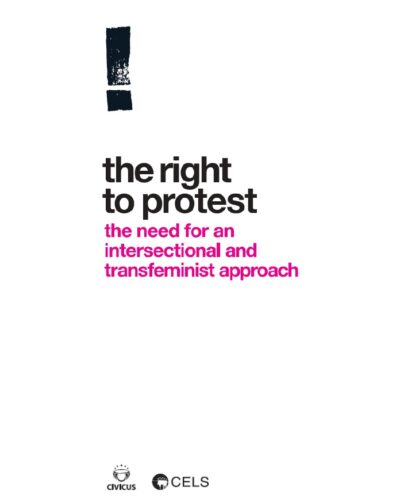IACHR: Request for a visit to Argentina to assess violations against indigenous peoples
Rights organizations and representatives of indigenous communities highlight an increase in violence and structural racism by the state, denial of access to territory, lack of prior consultation and the critical situation in the province of Jujuy.
2023 Emilio Mignone International Human Rights Award: nominations are open
Candidates will be admitted from July 10 to September 15, 2023. The award is inspired by the life and work of a founding member of CELS.
Guatemala: We call for the electoral process to be respected.
The national elections on June 25 were suspended by the courts. Almost two hundred organizations urge the State of Guatemala to take the necessary actions to ensure the integrity of the electoral process.
Migrants: serious human rights violations at international borders
Alongside 195 organizations worldwide, we demand that the UN establish an independent monitoring mechanism to investigate the treatment of migrants in border areas and its underlying structural causes.
Protests and escalation of state violence in the Argentine province of Jujuy
Mass mobilizations to protest for higher wages were further heightened by demonstrations against the constitutional reform proposed by the government of Jujuy. The government responded by quashing the demonstrations and criminalizing protesters, resulting in dozens of injured and arbitrary arrests. This new constitution passed in record time restricts the enjoyment of human rights and seeks to avoid social demonstration against the active expansion of mineral extractivism.
Limitations on the right to protest in Jujuy
This week, human rights organizations submitted a letter to the Constituent Convention expressing our concern about the proposed human rights setbacks in the province’s constitutional reform. The process has been conducted with unreasonably tight deadlines, lacking the necessary participation and debate, and raising concerns about its legality and legitimacy. This reform will have a detrimental impact on the right to protest, among others.
Conviction for sexual crimes committed at ESMA during the dictatorship
The Second Criminal Chamber of the Court of Appeals convicted Jorge “Tigre” Acosta for the sexual crimes committed against Graciela García Romero, who was kidnapped and held captive at the clandestine detention center known as ESMA. An earlier 2017 ruling had not taken into account her allegations. The Center for Legal and Social Studies (CELS) had supported Graciela’s pursuit of justice since 2005.
The Court of Appeals of the City of Buenos Aires confirmed the unconstitutionality of the use of the Fugitive Facial Recognition System (SRFP) implemented by the Buenos Aires City Government
The ruling confirms what CELS and the Observatorio de Derecho Informático Argentino (ODIA) have denounced: the system was operated outside the law that regulates it and without oversight mechanisms.
Más que nunca’s book release at teatro picadero
With Lef Nawel, Juan Ruocco, Dina Sánchez, Ángela Urondo Raboy, and Paula Litvachky on stage, before a full audience, we delved into the debates put forth in the new book published by CELS and Siglo XXI.
Urban drug trafficking, migrants, and the defense of activists: some of Cels’ topics for #fmdh23.
Between March 20 and 24, we will participate in the 3rd World Forum on Human Rights, organized by UNESCO, in Buenos Aires. As members of several committees, CELS is participating in more than a dozen activities for exchange and debate.
Magdalena massacre hearing at the IACHR: the State acknowledges responsibility for the 33 deaths
More than 17 years later, the Argentine State acknowledged before the Inter-American Commission on Human Rights its international responsibility for the incident and committed to put a series of measures in place to prevent such cruel deaths from ever happening again. CELS and the Colectivo de Investigación y Acción Jurídica (CIAJ) took part in the hearing as representatives of the victim’s families.
2023: shaping the future of democracy with human rights
Celebrations and debates will mark the 40th anniversary of Argentina’s democracy on December 10. From CELS, we are proposing content and spaces for participation to foster the collective momentum to navigate the challenges we are facing today.
The right to protest: the need for an intersectional and transfeminist approach
Autor/a: Luciana Pol (general coordination) Cynthia Palacios Reckziegel and Lucía Morale (fieldwork, reaserch coordination, and text)
42 pgs.
ver más
We filed a complaint against a company in the Techint Group for the disappearance of two human rights defenders in Mexico
The complaint was filed jointly with their families and organizations from Mexico and Luxembourg. We requested that urgent and necessary measures be taken in the search for lawyer Ricardo Lagunes Gasca and Antonio Díaz Valencia, who have not been heard from since mid-January. They disappeared after a community assembly regarding the Ternium company’s failure to make payments to the community for its mining activity.
UN universal periodic review: What is Argentina’s human rights situation?
Argentina will be reviewed in the United Nations Human Rights Council on Monday, January 23. It will have to report to its peers on compliance with its international commitments on human rights matters. CELS, along with other organizations, produced reports as prior contributions for the assessment and recommendations to be produced by this mechanism. We will also be present at the session in Geneva.
Brazil: the threat of the anti-democratic far right
The move to action by these groups is a call for reflection and urgent action. What happens when democracies provide the tools and possibilities for some groups to seek to limit or do away with those same democracies? And what tools do we have to defend democracy in the face of attacks like this one?



